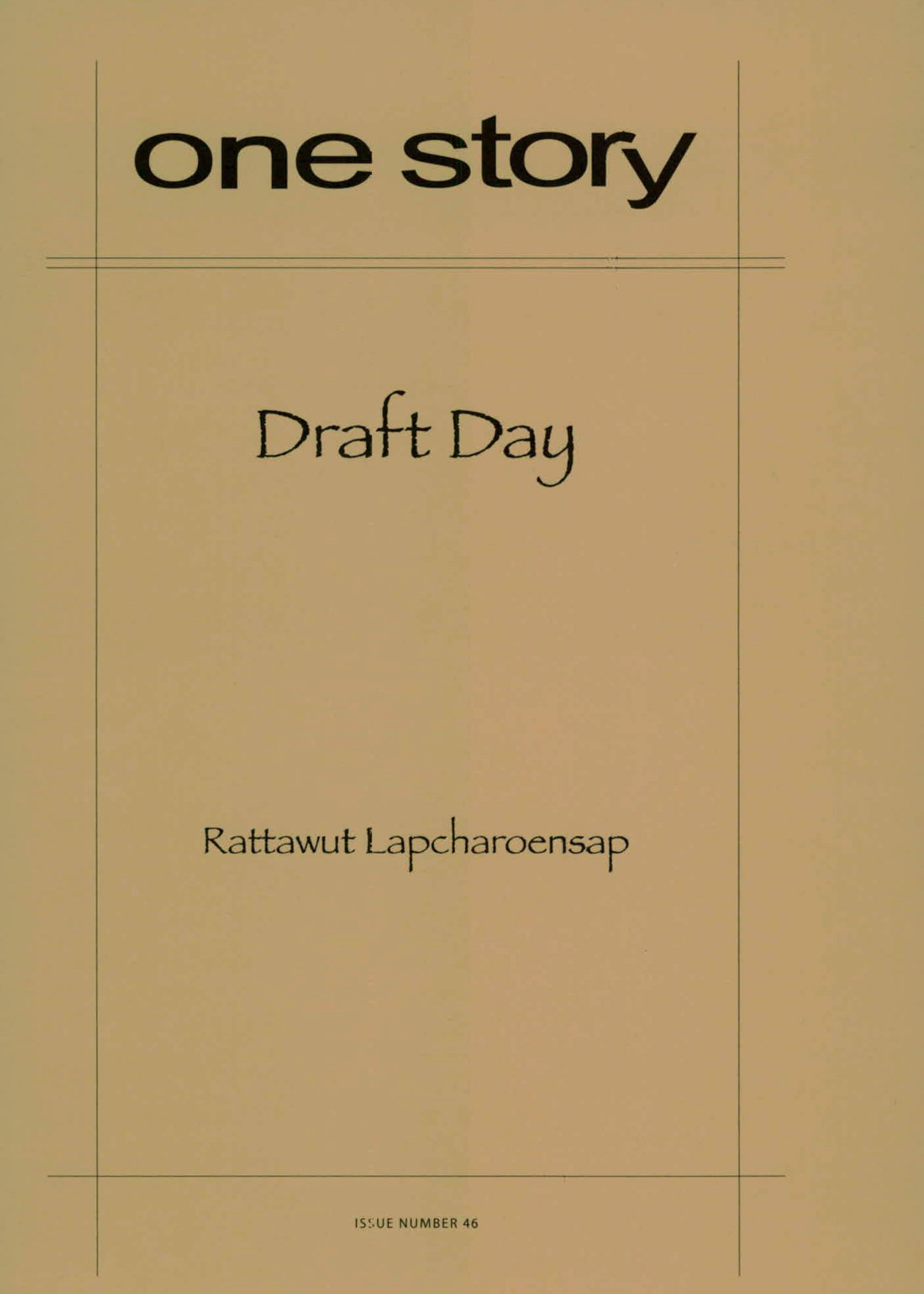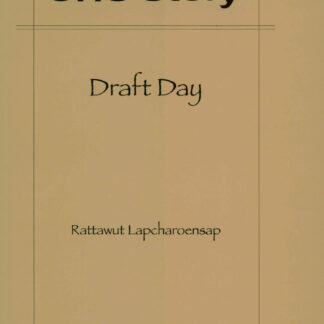
Draft Day
$2.50
30 in stock
Excerpt
On a pleasant morning in April I go three doors down to Wichu’s house and we walk to Wat Chaichana, the temple where the annual district draft lottery will be held. Wichu has been my best friend all my life. It is hardly sunup, the air thick and cool with dew. We walk silently through our neighborhood. The teashops. The dilapidated playground. The pond with its perpetual scrim of scum. The mangy strays sleeping haphazardly in the streets. The elderly Chinese women gossiping and exercising by the Shinto shrine. The porridge and plantain vendors. The Burmese refugees unloading thick bundles of Thai Rath and Matichon for the newsstand. We walk silently past all that we know like we know our own skins, all that we will remember fondly in our separate ways, though we regard them then as impediments to our youthful, inchoate ambitions. This is a few years before the neighborhood started sinking into the marsh ground upon which it had been built. This is before the floods got worse with every monsoon and the river rats appeared by the thousands and you could hear them splashing and squealing at night. Before those who could afford it fled for higher ground, my mother and my father among them.
Rattawut Lapcharoensap
Rattawut Lapcharoensap was born in Chicago and raised in Bangkok. He was educated at Triamudomsuksa Pattanakarn, Cornell University, and the University of Michigan, where he received an MFA in Creative Writing. His honors include the David TK Wong Fellowship, the Avery Jules Hopwood Award, and the Andrea Beauchamp Prize. His stories have appeared and are forthcoming in Granta, Zoetrope, and Glimmer Train, as well as Harcourt’s Best New American Voices series, edited this year by Francine Prose. He lives in Ann Arbor, Michigan. “Draft Day” is part of the collection SIGHTSEEING, which is forthcoming in January 2005 by Grove Press.
Q&A by Hannah Tinti
- HT: What was the most challenging aspect of writing this story?
- RL: Voice, tone, setting, conflict, plot, character, pacing, syntax, theme. Take your pick; nothing comes to me very easily. But, in the end, perhaps the most difficult thing was sustaining the story’s voice—its past tense masquerading as the present—and deciding when that voice would invariably collapse.
- HT: This ‘Draft Day’ felt so realistic. Is the draft really handled this way in Thailand? Do you know people who have gone through the process?
- RL: As required by law, I went through the process myself, as have all my male friends in Thailand. Nonetheless, the story’s naturalism is tenuous at best. (This is fiction, after all.) I significantly simplified things here—for example, various bureaucratic intricacies have been omitted because, well, they’re rather soul-crushingly boring. More importantly, the public drawing of cards is a practice that was discontinued several years ago, though it was a prominent feature for many years, which is why the story remains historically unspecific. And finally, military drafts in Thailand last even longer than the morning-to-evening affair presented in the story; in my case, I arrived at 7:30 in the morning and went home around midnight. It was a very long day.
- HT: There were moments in this, especially the building tension, that were reminiscent of Shirley Jackson’s “The Lottery.” Were you inspired at all by that story?
- RL: I’m incredibly flattered by the comparison, though Jackson’s magisterial gothic never occurred to me until now. Still, like many, I have debts. This story wouldn’t exist without Edward P. Jones’ “The First Day,” from his collection Lost in the City. That story is a heartbreaking evocation of the human revelations so often brought about by inhumane bureaucracies (among so many other things), and it possesses an ingenious voice that “Draft Day” parrots rather poorly. Likewise William Maxwell’s novel, So Long, See You Tomorrow: his narrator’s complex sense of guilt and betrayal haunts me still. And there is also a short story by Heinrich Boll, the name of which escapes me now, but whose investigation of the spiritual effects of corruption I’ve always admired.
- HT: When did you realize that Wichu knew what was happening? Did you decide this before you started writing?
- RL: Wichu’s understanding of the situation—as well as the relatives’—emerged very late in the revision process, when I realized that the plot had to confront the public nature of the corruption, whether I liked it or not. In the story’s early incarnations, Wichu simply didn’t know what was going on until the end, when the narrator goes onstage with the other fortunate boys. This is because I had foolishly misidentified the source of the story’s tension. Alas, the story wasn’t necessarily about whether or not Wichu knew, though that’s what the narrator superficially concerns himself with. (The narrator gets off too easily that way.) I later saw that the drama necessarily hinged upon the situation’s inevitability—the spectacle of young men acting out a social drama beyond their immediate control, a drama with very little room for improvisation—and that what I had here was a shamelessly corrupt social ritual annually performed for all to see.
- HT: How long did it take you to complete this story?
- RL: A rough draft was completed in two days. Revision, of course, took about a year. Unlike other writers I know, I’m full of bad ideas; not every idea I have is a good one. My stories are often born from an inability to finish other stories when faced at long last with the latter’s irrefutable awfulness. “Draft Day” is no exception. It began as an elaborate way to procrastinate from writing a novella that had been defeating me for many months. There is nothing so optimistic as a blank page (anything is possible!), and I’d hope to clear the palate. To do this, I of course also had to forget, momentarily, that there is nothing so dismal as a page full of bad sentences, imprecise sentiments, and awkwardly conceived scenes—which pretty much describes all my early drafts. Sure enough, “Draft Day” was terrible in its infancy; I evaded revision many times in order to pursue other half-baked ideas. And so on and so forth. But somehow I kept coming back to it—or it kept coming back to me—so go figure.
- HT: What is the best bit of advice about writing you have ever received?
- RL: I think Gertrude Stein once said something along the lines of “to write is to write is to write is to write.” I’ve always liked that. Nothing gets the writing done like writing itself. Nobody’s a writer unless they’re writing. The rest is irrelevant. And Charles Baxter’s Bringing Down the House is really as good as it gets.
- HT: What are you working on now?
- RL: I’m working on a novel, which is really a fancy way of saying I don’t know what I’m working on at all.
